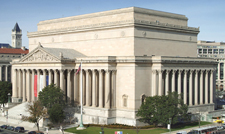 |
| Signing of the Constitution |
In September, celebrating the 20th anniversary of the progam, there will be an international conference sponsored by UNESCO, titled The Memory of the World in the Digital age: Digitization and Preservation.
Many countries have established national Memory of the World Committees. It might be a good time for the United States to do so. Such a committee could share U.S. experience with the preservation of documentary heritage, helping other nations to preserve materials that they hold of global importance.
The U.S. National Archives has just put on display one of four copies in the world of the Magna Carta. Signed in 1297, this great charter established limitation of the king's power in British law. It remains as the basis of British democracy.
We hold these truths to be self-evident, that all men are created equal, that they are endowed by their Creator with certain unalienable Rights, that among these are Life, Liberty and the pursuit of Happiness.The actual document of the Magna Carta joins the U.S. Declaration of Independence and the U.S. Constitution on public display in the National Archives. The Declaration of Independence is generally considered the most influential document in United States history. Its opening sentence has been claimed to be one of the best known in the English language. The United States Constitution is the oldest written constitution still in use, and has been used as a model by many other nations.
Opening sentence of the Declaration of Independence
I would suggest that these three documents be nominated by the United States for the Memory of the World Register as part of the U.S. participation in the 20th anniversary of the program.

3 comments:
I’m honestly surprised the documents aren’t part of the foundation already. Love or hate the state of the US Constitution today, you can’t say it isn’t among the most influential documents ever written.
It is really nice blog to get to know about the value of the education. I have never come across this kind of blog.
A lot of countries have national Memory of the World Committees. It might be now a good time for the USA to do so. Such a committee can help U.S. experience with the preservation of documentary heritage, helping other nations to preserve materials that they have a global importance.übersetzung übersetzer
Post a Comment